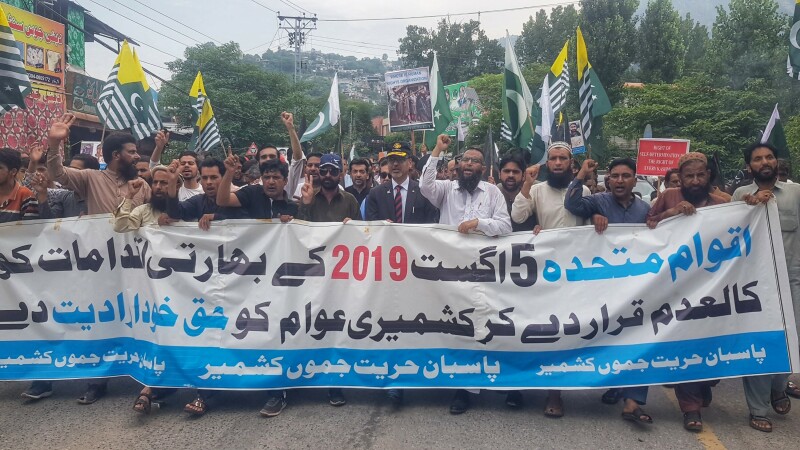Youm-e-Istehsal-e-Kashmir is being observed in Pakistan today. Pakistan’s top civil and military leadership condemned India’s actions in Jammu and Kashmir. The Narendra Modi administration’s brutality against the people of the disputed valley was denounced.
Five years ago, Modi’s government revoked the special status of Indian Illegally Occupied Jammu and Kashmir (IIOJ&K). This action divided the region into two federally administered territories, stripping Kashmiris of their right to self-determination.
Pakistan’s leadership strongly condemned India’s illegal occupation of Jammu and Kashmir. President Asif Ali Zardari, Prime Minister Muhammad Shehbaz Sharif, CJCSC, service chiefs, and the armed forces expressed their stance. They noted that the Kashmiris have awaited the United Nations’ fulfillment of its commitments for seven decades.
The international community must urge India to cease its human rights violations in IIOJK. Implementing the relevant UN Security Council resolutions is crucial.
President Zardari stated that Pakistan would continue to provide full moral, diplomatic, and political support for the Kashmiri struggle. August 5 marks five years of India’s campaign to consolidate its occupation of Jammu and Kashmir.
“On this day, five years ago, India took unilateral steps to undermine IIOJ&K’s disputed status,” he said. Since August 5, 2019, India has altered the demographic and political landscape of IIOJ&K. Domicile certificates for outsiders, voter registration for temporary residents, gerrymandering, and changing land ownership laws are part of this campaign.
“These measures violate UN Security Council resolutions and international law, including the 4th Geneva Convention,” he added. India’s actions since August 5, 2019, disregard international law, the Kashmiri people’s aspirations, and UN resolutions. India will not suppress the Kashmiri struggle through domestic legislation and judicial verdicts.
President Zardari highlighted the heavy militarization of IIOJ&K by Indian troops. Extensive documentation and global condemnation of human rights violations exist. The mistreatment of Kashmiri journalists and human rights defenders shows India’s lengths to silence dissent.
Prime Minister Shehbaz Sharif reaffirmed Pakistan’s support for Kashmiris. “This somber occasion reminds us of the consequences of India’s actions on August 5, 2019,” he said. India has tried to convince the world that Jammu and Kashmir is an integral part of its territory. However, international law, historical facts, and the situation on the ground deny India’s claims.
Efforts in IIOJ&K aim to silence Kashmiri leadership and muzzle the media. Political prisoners number in the thousands, and 14 political organizations are outlawed. Harassment, arbitrary detentions, and cordon-and-search operations are routine. Indian forces operate with impunity under draconian laws.
Prime Minister Sharif saluted the courage of the Kashmiri people. “India’s coercive methods have failed to diminish their yearning for self-determination,” he stated. Durable peace in South Asia depends on resolving the Kashmir dispute. The international community must urge India to halt human rights violations in IIOJK. India must reverse its actions from August 5, 2019, repeal draconian laws, and implement UN resolutions on Kashmir.
The CJCSC, service chiefs, and armed forces reaffirmed their solidarity with the people of IIOJ&K. They support their legitimate struggle for self-determination. The Indian security forces’ violations of international law, including military lockdowns and human rights abuses, are reprehensible. These actions perpetuate security and humanitarian crises in IIOJ&K, threatening regional stability.
Lasting peace and stability hinge on resolving the Kashmir dispute according to UN resolutions and the aspirations of the Kashmiri people.
President Azad Jammu and Kashmir, Barrister Sultan Mahmood Chaudhry, termed August 5 as the darkest day in Kashmir’s history. India’s move to strip the region of its special status violates UNSC resolutions. The revocation of Article 370 and 35-A aimed to change Jammu and Kashmir’s political and constitutional status. State terrorism against Kashmiris has intensified since August 5, 2019.


